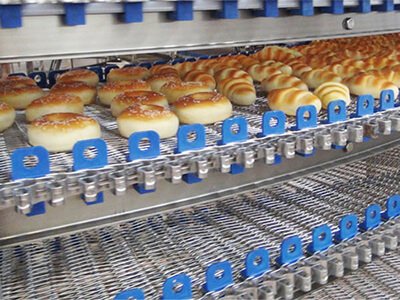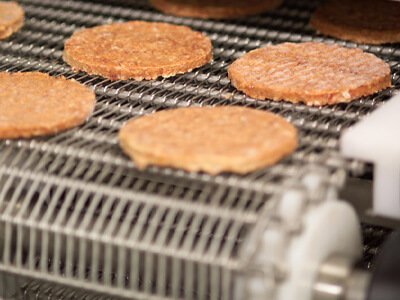Standard Flexible Rod Belts
HOME / PRODUCTS / Metal Conveyor Belts / Standard Flexible Rod Belts
Flexible Rod Spiral and Turn Curve Belts for Multilayer Spiral Freezers
Flexible rod conveyor belts, also known as Spiral Metal Belts, Stainless Steel Spiral Freezer Conveyor Belting, Spiral Cooling Tower Conveyor Belt. In the context of multi-tier spiral conveyors in the food industry, flexible rod belts play a crucial role.
Flexible rod conveyor belts are constructed using a combination of alternating spirals, smooth cross rods, and special chain links with button heads. The specific design of flexible rod conveyor belts allows them to be used in both straight and curved sections of conveyor systems.
The versatility of Flexible Rod Belts makes them suitable for various processes in the food industry, including cooking, cooling, freezing, baking, pasteurizing, blanching, proofing dough, drying, and more.
Specification
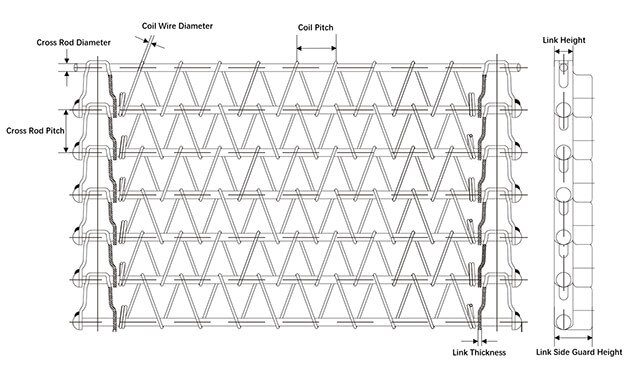

| Technical Specifications | Popular Value |
| Coil Wire Diameter | 1.2mm, 1.4mm, 1.5mm, 1.6mm, 1.7mm, 1.8mm, 2.0mm |
| Coil Pitch | 6.5 – 25.4 mm |
| Cross Rod Diameter | 4.9mm, 5.0mm, 5.9mm, 6.0mm |
| Cross Rod Pitch | 19.05mm, 25.40mm, 27.40mm, 30.5mm, 38.1mm |
| Link Thickness | 2mm, 2.5mm, 2.7mm, 3.1mm |
| Link Height | 11.1mm, 12.7mm, 15mm |
| Link Side Guard Height | 24 mm, 26 mm, 38.1 mm |
| Available Widths (Curve/Spiral) | 304.8-1376.0 mm |
| Available Widths (Straight Run) | 304.8-1524 mm |
| Turn Ratio | 1.6 – 2.5 |
| Material | Stainless steel 304, Stainless steel 316L |
Belt Mesh Overlay Type


Balanced Weave Mesh
Provides a flat and stable surface. Offers good flexibility and can handle a variety of product shapes and sizes. Well-suited for applications where a smooth and even surface is important.


Unilateral Weave Mesh
Can be designed for increased strength in a specific direction. Suitable for applications where directional strength or specific performance characteristics are crucial.
Links Availability
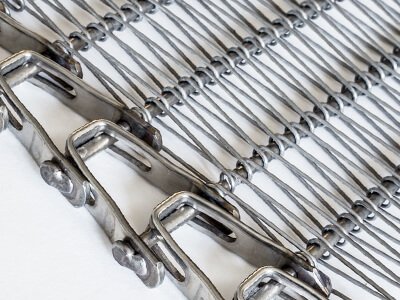

Spiral Metal Belt with Standard links
The most commonly used, stable, reliable and durable links.
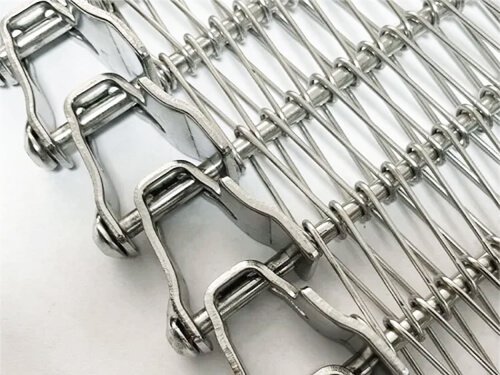

Spiral Metal Belt with Guard Edge Links
Side guards are attached to the edges of the belt to create a containment area that prevents products from falling off the sides during transport. The height and design of the side guards can vary based on the specific requirements of the application.
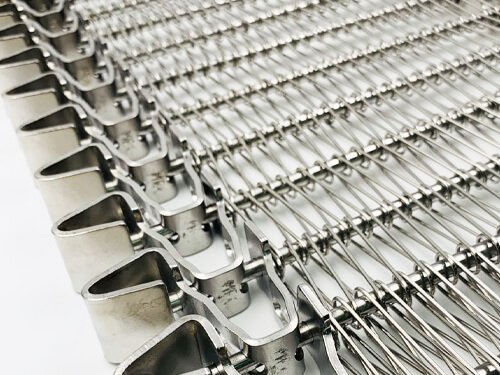

Spiral Metal Belt with Edge Drive Links
The positive edge drive and cageless design minimize the risk of catastrophic failures, such as belt flipping or misalignment. This enhances the reliability and stability of the conveyor system during operation.
Edge Availability
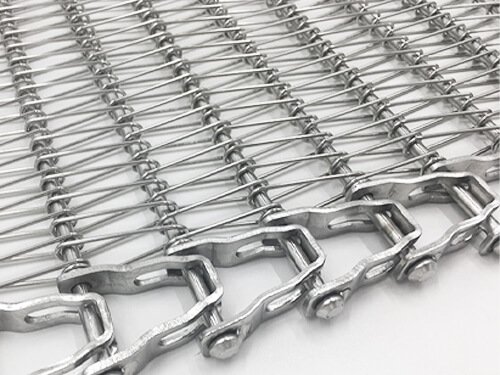

Spiral Metal Belt with Welded Button Edge
Sturdy and durable, it can meet most application scenarios and is extremely cost-effective.
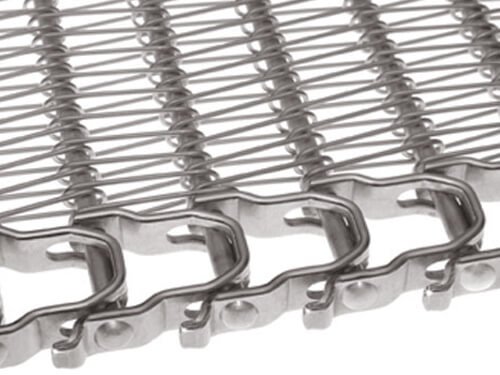

Spiral Metal Belt with 360° Welded Edge
In contrast to a conventional bridge weld, the 360° buttonless weld is devoid of surface imperfections and crevices. This enhances hygienic properties by eliminating the potential for bacteria entrapment. Additionally, it offers a greater product load capacity and reduces wear on the caps of spiral system cage bars.
Flexible Rod Conveyor Belts offer several advantages in various industrial applications due to their unique design and features. Here are some key advantages:
- Versatility
Flexible rod conveyor belts are designed for both straight and curved conveyor sections, providing versatility in conveyor system layouts. This adaptability is particularly useful in industries where the conveyor path needs to navigate around obstacles or follow specific routes. - Smooth and Burr-Free Finish
The smooth and burr-free finish of the links allows for quick and easy cleaning. This is crucial in industries like food processing where cleanliness is essential for product safety and hygiene. - Durable and Long Service Life
The combination of high-quality materials and a rigid structure ensures durability, resulting in a long service life. This feature is crucial for minimizing downtime and maintenance costs. - Easy to Install and Replace
The lightweight design of the flexible rod conveyor belt makes it easy to install and replace. This ease of installation contributes to overall system efficiency and reduces downtime during maintenance. - Side Guards Available
Side guards can be added to both sides of the conveyor belt to prevent products from spillage. This is important for maintaining a clean and safe working environment.
Flexible rod conveyor belts find applications in various industries due to their unique design and characteristics. Some common applications include:
- Food Industry
Cooling, Cooking, Freezing: Flexible Rod belts are widely used in the food industry for processes such as cooling, cooking, and freezing of products like baked goods, confectionery, vegetables, and meat. - Bakery Industry
These belts are utilized as cooling belts in bakeries for the efficient cooling of freshly baked goods. - Confectionery and Chocolate Industry
In the confectionery and chocolate industry, Flexible Rod belts serve as conveyor belts for the handling and processing of delicate products. - Chemical Industry
Flexible Rod belts are suitable for conveying materials in the chemical industry. The corrosion-resistant properties of stainless steel make them ideal for handling various chemicals. - Material Handling
These belts are used for continuous transportation of a wide range of materials in industries such as manufacturing and production. - Drying Processes
Flexible Rod belts are employed in drying applications where products need to pass through a drying process efficiently. - Material Processing
In various manufacturing industries, these belts are employed for the conveyance of materials during different stages of processing. - Specialty Applications
Flexible Rod belts are utilized for specialized applications such as blanching vegetables, proofing dough, baking, and pasteurizing.

